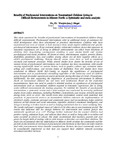Benefits of Psychosocial Interventions on Traumatized Children Living in Difficult Environments in Mbeere North: A Systematic and meta-analysis
Abstract
This study examined the benefits of psychosocial interventions of traumatized children living difficult environments. Psychosocial interventions refer to additional forms of assistance for child development other than educational or practical interventions. Children who have experienced any form of trauma or lack necessary basic needs require additional and specific psychosocial interventions. From reviewed studies, substantial evidence shows that exposure to traumatic experiences out of living in difficult environments can affect brain functions of children, have long-lasting consequences resulting to poor mental health and various psychological and social problems. All forms of abuse, abandonment, neglect, poverty, illness, disabilities, pandemics, loss, and conflict, among others can all have negative effects on a child’s psychosocial wellbeing. Trauma directly causes stress fears as well as emotional reactions and memory processes. While several studies have shown the benefits of use of various forms of psychosocial interventions such evidence has been inconsistent, with results varying significantly based on various factors, such as gender, culture, age, economic status setting and conflict-phase, and various forms of disabilities. Very few studies have been conducted in Mbeere North Sub-County, as regards the significance of psychosocial interventions such as psychosocial counselling regardless of the numerous cases of children going through traumatic experiences and in particular during this time of Covid-19 pandemic. Additionally, the data supporting the importance of psychosocial interventions in Mbeere North on traumatized children has not been well synthesized. Based on the evidential inconsistencies, there was need to conduct a detailed analysis on significance of psychosocial interventions used on traumatized children exposed to traumatic experiences due to living under difficult environments for healing purposes. To establish the benefits of psychosocial interventions, a systematic review and a meta-analysis was conducted by searching published studies from online databases, including PubMed, Clinicaltrials, and various relevant journals dating from 2000 to 2020. The results from nine randomized control trails indicated that provision of psychosocial services on traumatized children enhances the implementation of children’s rights, promotes personal and community peace and reconciliation, helps children improve on self-esteem and social awareness, improves children’s emotional intelligence, and brings in healing to broken hearts as well as helping individuals live in a more satisfying lives. The results indicated a weighted mean of Cohen's d 0.6 effect size in post treatment period. The results also indicated that the change between the intervention and control groups was statistically significant at p <.05. Findings further indicated that the assisted children had positive coping, enhanced hope, and reduced their fears, as well as being able to socialize and some accepted to return to school. The study recommends that teachers, parents and care givers be taught skills of dealing with in child trauma so that they can assist their children. The study also recommends that the stakeholders in Mbeere North sensitize the community and the parents on the benefits of provision of psychosocial interventions so that they can help children deal with post-traumatic stress disorder complications. Further, the local community needs to be economically empowered so that they can support their children towards accessing education and other services.

